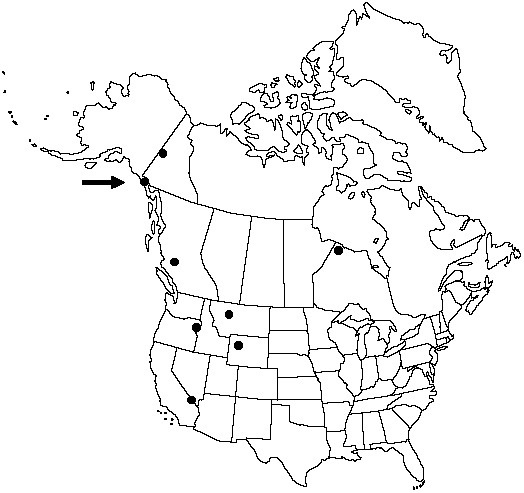Difference between revisions of "Botrychium ascendens"
Amer. Fern J. 76: 36, figs. 1, 2. 1986.
FNA>Volume Importer |
imported>Volume Importer |
||
| (7 intermediate revisions by 2 users not shown) | |||
| Line 8: | Line 8: | ||
}} | }} | ||
|common_names=Upswept moonwort | |common_names=Upswept moonwort | ||
| + | |special_status={{Treatment/ID/Special_status | ||
| + | |code=E | ||
| + | |label=Endemic | ||
| + | }} | ||
|basionyms= | |basionyms= | ||
|synonyms= | |synonyms= | ||
| Line 17: | Line 21: | ||
}}<!-- | }}<!-- | ||
| − | --><span class="statement" id="st- | + | --><span class="statement" id="st-undefined" data-properties=""><b>Trophophore </b>stalk 3–10 mm, 1/6 length of trophophore rachis; blade yellow-green, oblong to oblong-lanceolate, 1-pinnate, to 6 × 1.5 cm, thin but firm. <b>Pinnae</b> to 5 pairs, strongly ascending, well separated, distance between 1st and 2d pinnae not or slightly more than between 2d and 3d pairs, basal pinna pair approximately equal in size and cutting to adjacent pair, obliquely narrowly cuneate, undivided to tip, margins sharply denticulate and often shallowly incised, apex rounded, venation like ribs of fan, midrib absent. <b>Sporophores</b> 2-pinnate at base of sporangial cluster, 1.3–2 times length of trophophore. <b>2n</b> =180.</span><!-- |
-->{{Treatment/Body | -->{{Treatment/Body | ||
| + | |phenology=Leaves appearing in late spring to midsummer. | ||
|habitat=In grassy fields, widely scattered | |habitat=In grassy fields, widely scattered | ||
|elevation=0–2500 m | |elevation=0–2500 m | ||
|distribution=B.C.;Ont.;Yukon;Alaska;Calif.;Mont.;Nev.;Oreg.;Wyo. | |distribution=B.C.;Ont.;Yukon;Alaska;Calif.;Mont.;Nev.;Oreg.;Wyo. | ||
| − | |discussion=<p>Botrychium ascendens is a distinctive little moonwort that grows with B. crenulatum, B. lunaria, and B. minganense. This species and B. pedunculosum are the only grapeferns that often have extra sporangia on the proximal pinnae.</p> | + | |discussion=<p><i>Botrychium ascendens</i> is a distinctive little moonwort that grows with <i>B. crenulatum</i>, <i>B. lunaria</i>, and <i>B. minganense</i>. This species and <i>B. pedunculosum</i> are the only grapeferns that often have extra sporangia on the proximal pinnae.</p> |
|tables= | |tables= | ||
|references= | |references= | ||
| Line 32: | Line 37: | ||
-->{{#Taxon: | -->{{#Taxon: | ||
name=Botrychium ascendens | name=Botrychium ascendens | ||
| − | |||
|authority=W. H. Wagner | |authority=W. H. Wagner | ||
|rank=species | |rank=species | ||
| Line 39: | Line 43: | ||
|basionyms= | |basionyms= | ||
|family=Ophioglossaceae | |family=Ophioglossaceae | ||
| + | |phenology=Leaves appearing in late spring to midsummer. | ||
|habitat=In grassy fields, widely scattered | |habitat=In grassy fields, widely scattered | ||
|elevation=0–2500 m | |elevation=0–2500 m | ||
| Line 45: | Line 50: | ||
|publication title=Amer. Fern J. | |publication title=Amer. Fern J. | ||
|publication year=1986 | |publication year=1986 | ||
| − | |special status= | + | |special status=Endemic |
| − | |source xml=https:// | + | |source xml=https://bitbucket.org/aafc-mbb/fna-data-curation/src/2e0870ddd59836b60bcf96646a41e87ea5a5943a/coarse_grained_fna_xml/V2/V2_668.xml |
|genus=Botrychium | |genus=Botrychium | ||
|subgenus=Botrychium subg. Botrychium | |subgenus=Botrychium subg. Botrychium | ||
|species=Botrychium ascendens | |species=Botrychium ascendens | ||
| − | |||
| − | |||
| − | |||
| − | |||
| − | |||
| − | |||
| − | |||
| − | |||
| − | |||
| − | |||
| − | |||
| − | |||
| − | |||
| − | |||
| − | |||
| − | |||
| − | |||
| − | |||
| − | |||
| − | |||
| − | |||
| − | |||
}}<!-- | }}<!-- | ||
-->[[Category:Treatment]][[Category:Botrychium subg. Botrychium]] | -->[[Category:Treatment]][[Category:Botrychium subg. Botrychium]] | ||
Latest revision as of 20:24, 5 November 2020
Trophophore stalk 3–10 mm, 1/6 length of trophophore rachis; blade yellow-green, oblong to oblong-lanceolate, 1-pinnate, to 6 × 1.5 cm, thin but firm. Pinnae to 5 pairs, strongly ascending, well separated, distance between 1st and 2d pinnae not or slightly more than between 2d and 3d pairs, basal pinna pair approximately equal in size and cutting to adjacent pair, obliquely narrowly cuneate, undivided to tip, margins sharply denticulate and often shallowly incised, apex rounded, venation like ribs of fan, midrib absent. Sporophores 2-pinnate at base of sporangial cluster, 1.3–2 times length of trophophore. 2n =180.
Phenology: Leaves appearing in late spring to midsummer.
Habitat: In grassy fields, widely scattered
Elevation: 0–2500 m
Distribution

B.C., Ont., Yukon, Alaska, Calif., Mont., Nev., Oreg., Wyo.
Discussion
Botrychium ascendens is a distinctive little moonwort that grows with B. crenulatum, B. lunaria, and B. minganense. This species and B. pedunculosum are the only grapeferns that often have extra sporangia on the proximal pinnae.
Selected References
None.